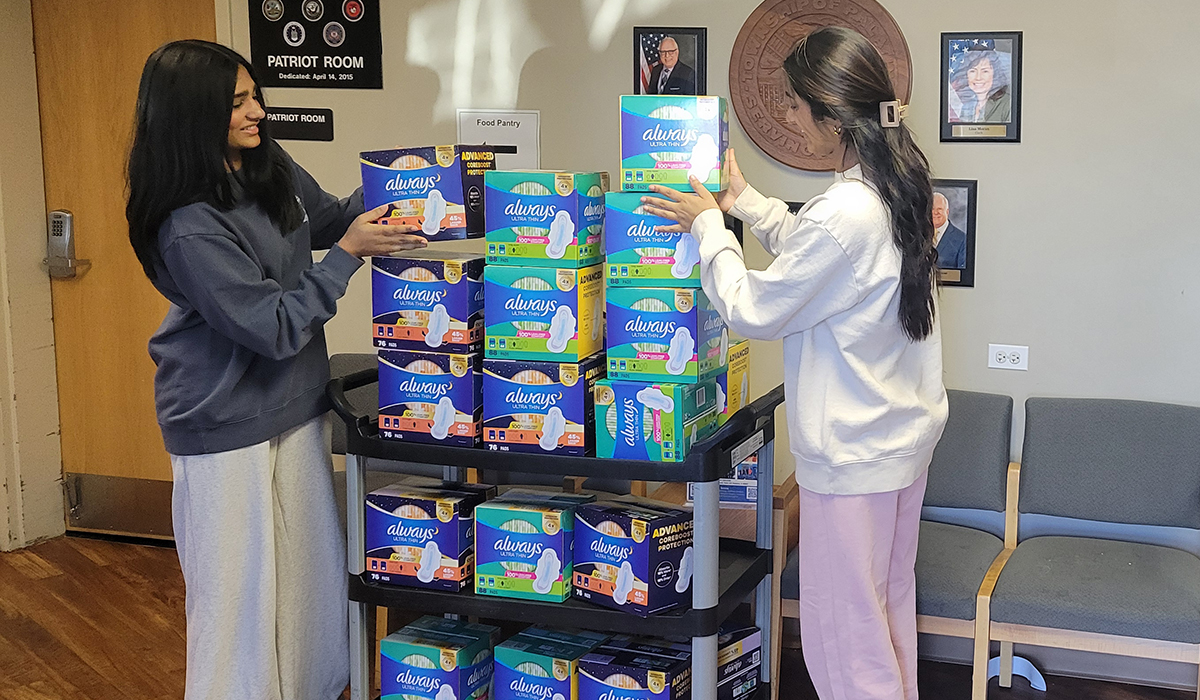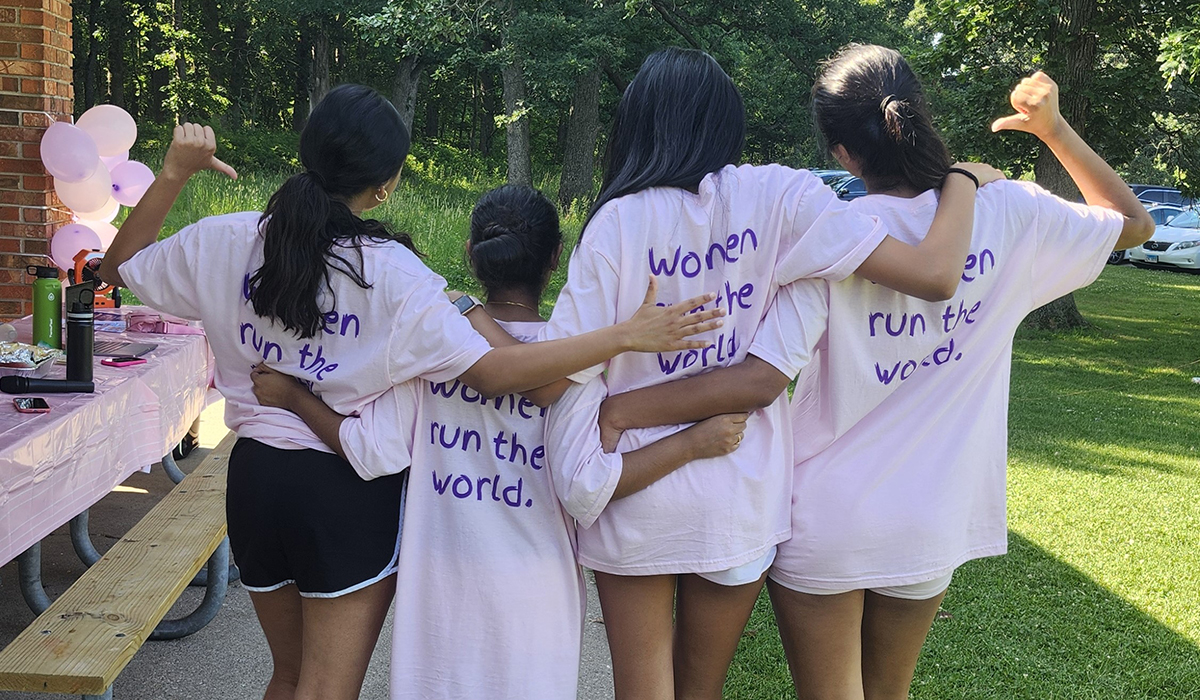SMASHING THE STIGMA OF PERIOD POVERTY

Meet Daily Point of Light Award honoree Niyathi Girish. Read her story, and nominate an outstanding volunteer or family as a Daily Point of Light.
Niyathi Girish wants to make a difference in her own community and across the globe.
Three years ago, Niyathi witnessed the stigma around bodily functions when a girl in her science class unexpectedly got her period and bled through her white sweatpants. Surrounded by students who aspired to be medical professionals one day, the response was one of shame and embarrassment. Seeking to smash the stigma of periods, Niyathi and a group of friends formed Every 28 Days, an organization that strives to donate 500 million sanitary pads to underserved populations while promoting menstrual health education and destigmatization campaigns related to menstruation.
In the last three years, the Every 28 Days team has created a movement that’s moved far beyond the walls of their high school. Niyathi has led donation drives, educational workshops and corporate fundraisers to support underserved women locally and globally. She devotes significant time to organizing important partnerships with organizations, gathering products and distributing essential supplies to schools, shelters and underserved communities to make period poverty a thing of the past. Extremely passionate about the partnerships that make nonprofits successful, Niyathi has worked tirelessly to raise funds for Nyaka Global so girls at a school in Uganda can have the menstrual supplies they need to continue their education without disturbance. Along with her team members, Niyathi has raised over $30,000 and distributed more than 100,000 hygiene products to communities in the U.S., India, Uganda and South Africa.
Currently a senior in high school, Niyathi works hard to balance her rigorous academic career with her volunteer work and extracurricular activities. But her work with Every 28 Days has also informed her potential future career. When she starts college, she’s hoping to major in pre-med and eventually become a doctor. She’s leaning toward neuroscience, but is also interested in exploring women’s health, which ties into her work with the organization. While helping people find access to menstrual supplies and products may not seem like a major endeavor, it’s an important component in the mission to improve healthcare accessibility at all levels. Niyathi’s determination to help young women in her community and abroad not only started a movement but also potentially forged her future career path. Through volunteerism, Niyathi found her life’s purpose.

What inspired you to get started with this initiative?
I co-founded Every 28 Days almost three years ago with three of my peers. Initially, it began as a small initiative with a few high school students trying to collect menstrual products for local shelters, but it’s grown into a global nonprofit that we’ve dedicated to ending period poverty and breaking the stigma around menstruation. For me personally, the spark came during my freshman year. I was in biology class, and one of my closest friends unexpectedly got her period and bled through her white sweatpants, and she was incredibly embarrassed. I immediately tried to comfort her and find her a pad. But what stood out was how the boys and the other kids at our lab table reacted. These kids who claimed that they wanted to be the future surgeons of the world turned red and muttered to themselves as if periods were something disgusting. At that moment, it really made me realize how deeply ingrained in us the stigma around menstruation is. When I began talking with my peers and my fellow co-founders, I realized that we had all lived through such experiences where menstruation was treated with silence, shame or ridicule, and that mutual understanding really bonded us.
Tell us about your volunteer role with Every 28 Days.
As a co-founder, my role is primarily focused on fundraising, outreach and partnerships. Together, my team and I have spearheaded many of our campaigns, and our largest event to date was our 5K. Behind the scenes, I primarily work on reaching out to potential partners so we can spearhead campaigns like our 5K, for which we partnered with Teeem, which is The Empathy and Entrepreneurship Equity Movement. Additionally, we’ve also partnered with companies like HERE Technologies. I have reached out to all of these businesses to start these partnerships. In addition to that, we also have to determine where we want the money to be donated. We’ve worked with a lot of smaller shelters, women’s shelters and food pantries in our own community, but also in India and Uganda. Locating those specific organizations we really believe we can help the most is also one of my bigger roles.
What are your long-term plans or goals for the organization?
Our long-term vision has multiple layers. We remain committed to our ambitious goal of donating 500 million menstrual products, because that is the number of women who lack access to menstrual products every year. This number alone won’t solve this issue, but that is one of our primary focuses at Every 28 Days. That’s why we’re also focusing on sustainable solutions, like trying to see if we can find opportunities for lower-cost reusable pads for rural or underserved communities.
We’ve started youth-led chapters in Colorado and Texas, and we want to expand this model so that students everywhere feel empowered to take on leadership roles in fighting period poverty. Another key part of our long-term vision is education. In elementary school, we were first shown the video about menstruation, and the girls and the guys were separated. It was really outdated and awkward and surrounded by stigma. That shouldn’t be the introduction young kids have to something so natural. I want Every 28 Days to create a modern, inclusive, empowering and educational tool that can normalize menstruation from the very start and de-stigmatize it in children so that it doesn’t become an issue in adulthood.
What’s been the most rewarding part of your work?
Without a doubt, it’s seeing the look on people’s faces when we’re able to donate products to them and help them out. As I mentioned before, our 5K fundraiser has been one of our most rewarding fundraisers. We partnered with Teeem, which I mentioned earlier, and were able to raise nearly $10,000. This event brought together hundreds of people from our communities, and the energy on the race day was so high. It was proof that when we were able to create this platform around such a stigmatized issue, and we were able to get people to rally around us and help us out.
What have you learned through your experiences as a volunteer?
Primarily, I’ve learned that persistence matters more than perfection. At our first fundraiser, we raised around $25. If we had stopped there, Every 28 Days wouldn’t even exist. Instead, we analyzed what worked, what didn’t, and we tried over and over again, and that persistence eventually led us to raise tens of thousands of dollars and distribute over 100,000 products worldwide. Like I mentioned before, I’m also surrounded by a wonderful team that I work with, and so I’ve learned the power of teamwork. I know it sounds a little bit cliché, but every success we’ve had has been because of my co-founders, our volunteers and us all working together. Leadership isn’t about doing everything yourself. It’s about creating an environment where everyone’s strengths can shine. I think perhaps the biggest lesson that I’ve learned is that the stigma thrives in silence. The more we speak about it openly, the more people are willing to join the conversation and break the taboo.

Why is it important for others to get involved with causes they care about?
None of us were experts on this issue when we started, but the more we’ve worked with it, the more we’ve learned about this topic. If you’re a passionate student, I think getting involved with something like this can really broaden your horizons and expose you to something that they don’t teach you at school. It is a nonprofit, but there are so many like business aspects to it. If you surround yourself with people who share your vision and have peers and mentors who support you, you can really make a difference and impact the people around you. I’ve built such strong connections through Every 28 Days.
Any advice for people who want to start volunteering?
Don’t wait until you feel ready. None of us were experts when we started. We were just passionate students who shared a frustration. If you begin small and accept that you’re going to make mistakes, you can grow so much through this experience, and your small beginnings can evolve into really big movements. The biggest difficulty with starting something like this is the starting itself. My second piece of advice would be to surround yourself with people who share that vision. If you find something that lights a spark and you’re really interested, follow it and go for it, because you never know where it could take you.
What do you want people to learn from your story?
This involvement creates a ripple effect far beyond just one person. Our small actions have turned into such a big initiative. Our main goal with this was to destigmatize menstrual health, and obviously, we’re far away from that. But if people could take the time out of their day to understand our mission, I feel like everyone would begin to understand that we need to have a mindset shift. I’m an Indian girl, and growing up in a household where it is seen as something that’s rather gross, there is a lot of stigma surrounding it. I think if someone could take anything away, I think it’s to break that stigma. I think you have to be the first person to speak up about it and take that step, because otherwise, it’s just going to thrive in silence. It’s only broken if we speak about it openly.
Do you want to make a difference in your community like Niyathi? Find local volunteer opportunities.